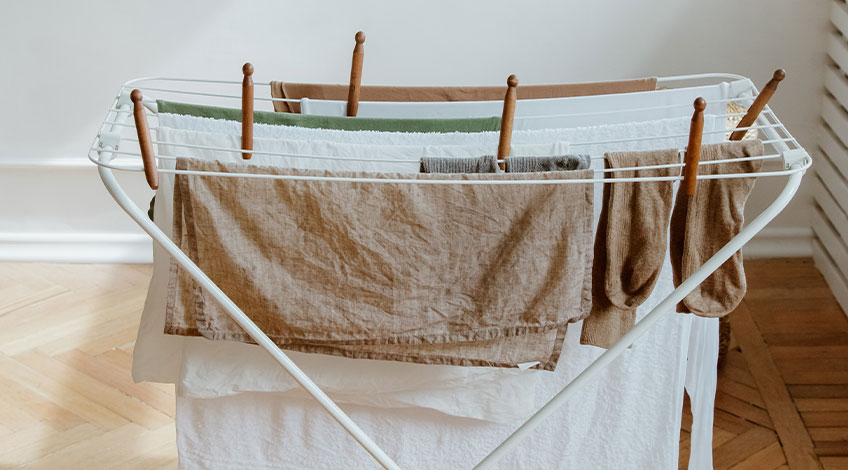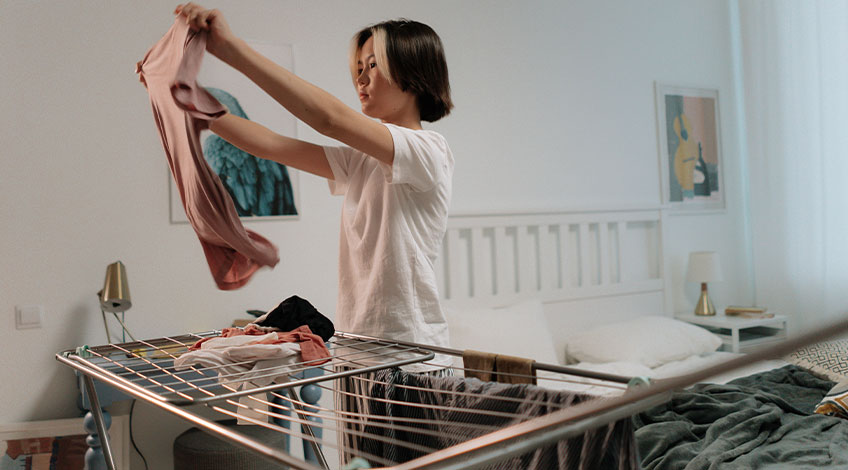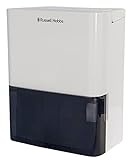
Is It Bad To Dry Clothes In The Bedroom? (or is it ok)
With the weather we get here in the UK, even in the summer, drying clothes can be problematic especially if you don’t have a tumble dryer. This means at some point you will need to dry your laundry indoors and while this is not ideal, it’s better than having wet washing. But is it bad to dry laundry in the bedroom?
The simple answer is yes, it is bad to dry clothes in the bedroom as it can cause dampness, which can lead to a number of problems in your home and to your health.
In this article we will look deeper into the issues with drying clothes in your bedroom and look at ways to solve them.
Is It Safe To Dry Clothes Indoors?
Air drying clothes indoors is perfectly safe and even drying clothes in the bedroom is safe from the point of view of the clothes. The clothes will dry safely, and in most cases, no harm will come to you as long as you stick to a few simple rules.
There are health concerns that we will need to address later on, but from a purely practical perspective, what else are you going to do? Not washing your clothes until spring or a dry spell isn’t going to work for most of us.
What Are The Reasons For Drying Clothes Indoors?

There are several reasons why we need to dry our clothes indoors. We touched on the weather briefly before, but let’s list all of the reasons why we need to dry clothes indoors. They include;
Bad Weather Throughout Most Of The Year
This is the main reason why people dry clothes indoors in the UK and in many other parts of the world as well. During winter months the weather is often too bad to dry clothes outdoors and even in the other three seasons you can never truly bank on good drying days.
Bad weather often turns our homes into indoor laundries where clothes are drying in many rooms.
No Access To Outside Space
Many of us live in flats or apartments that don’t have any gardens or a shared garden where drying washing is not permitted. This is true in the UK, all through Europe and in many parts of the US as well.
This means you can either get clothes dry in a tumble dryer or fill the home with wet washing.
It Saves You Energy
With the recent electricity price increases, we’re all trying to reduce our energy usage where we can. Maybe this is why you don’t want to use your tumble dryer.
Air drying clothes makes sense from a money saving point of view even if you have to air dry indoors.
It’s also cheaper than taking your wet laundry to the laundrette, and far more convenient too.
It Stops Your Clothes Getting Stolen
It’s a sad fact of life nowadays that nothing is safe unless it’s bolted down. There have been many instances of clothes being stolen from washing lines up and down the country.
This could mean drying clothes outdoors is only possible when you’re around to keep watch on them. Which could be another reason why you need to leave clothes drying indoors especially if you’re out at work all day.
Why Is It Bad To Dry Clothes In A Bedroom?

Many people have asked this question and in all honesty there are a few reasons why drying clothes in a bedroom is a bad idea. For a start, it’s called a bedroom not a “laundry room” and there are other reasons why it’s not such a good idea which include;
It Takes Up A Lot Of Space
To dry clothes in the bedroom takes space which is often lacking in our bedrooms. In an ideal world, you’ll have a spare room which doesn’t get used and this can be used to dry laundry.
But the reality is often quite different and you only have the rooms in your home that are in constant use. This means setting up a clothes airer or rack in your bedroom which takes up floor space which makes it difficult to move around the room.
This is especially true in the middle of the night when you need a glass of water or whatever. Catching your foot on the leg of the airer is a very real possibility and one that could have disastrous results.
It Causes Damp Air
You know that smell of old buildings or the smell you get when walking into a closed room that hasn’t been opened for a long time. That smell is caused by damp stuffy air and is likely to be what your bedroom will smell like after a while if you’re drying clothes in there.
This is especially true if you don’t have any ventilation in the room. Which can often be the case in the middle of winter when it’s freezing outside.
Mould & Mildew Thrive In Damp Conditions
There have been several scientific studies done in recent years that have all found that up to 30% of the moisture found in our homes is caused by drying clothes indoors. Unless there is sufficient ventilation, that moisture has absolutely nowhere to go and can cause structural and health issues unless it’s addressed.
The problem is that as the wet clothes dry, they release water molecules into the air. The moisture produced by those water molecules ends up forming on walls, floors, wooden surfaces etc.
The moisture creates the perfect breeding ground for mould and mildew spores. The damp air is also the perfect breeding ground for dust mites too.
These spores and dust mites act as irritants which can cause complications for those of us with COPD or other breathing issues including asthma.
Aspergillosis
One of the more common mould spores is Aspergillus Fumigatus. Which causes a condition that’s called Aspergillosis which is caused when those particular mould spores are present in the air that we breathe.
For those with breathing problems or anyone who is susceptible to allergies this can cause coughs, sneezes and runny noses. However, for those with more serious problems like COPD or asthma, these spores can trigger far more serious complications.
Then there’s the overall effect these mould spores have on our immune system. Which can lead to complications of the lungs, eczema and make otherwise healthy people susceptible to any illness that’s going around.
Damp, mouldy conditions can also create damp, musty smelling air in the bedroom. These are not the best conditions to get clothes dry or to sleep in either.
The damp, humid air can trigger eye irritations, coughs, sneezes and a runny nose in the healthiest of people. If this humid moist air is then heated in an attempt to get the clothes dryer faster, it can become too hot for you to sleep comfortably.
Which can lead to other health issues because our bodies repair themselves as we sleep. If our sleep is impaired, the body cannot repair itself which leads to us becoming run down.
Our immune systems become compromised and we catch whatever bugs and illnesses are going around. Plus our bodies rely on the temperature dropping overnight to help us maintain our circadian rhythms.
Heating up the bedroom in order to dry clothes may impact on our bodies ability to fall asleep or remain asleep.
Can Drying Clothes In A Bedroom Cause Structural Damage?

The damp air that forms water droplets on the walls, floors and surfaces of your bedroom will cause structural damage over time if not treated. You’ll soon start to notice damp patches on wallpaper, rotting floorboards, stains on the carpets or wooden furniture beginning to turn an off colour and becoming weak.
Not to mention the likely damage to window frames and sills as well as skirting boards. Plus there’s the possibility of the ceiling becoming wet too!
This adds even more concerns as there’s not only the ceiling that will need repairing and redecorating – The problems could even extend into the rafters and joists that make up the roof of your home.
Many of these issues can be treated before they get too far, but it’s still extra work and unnecessary expense that could’ve been avoided.
If left, replacement and repair costs could run into hundreds or even thousands of pounds. This is why it is far better to take preventative measures before it becomes a problem.
Is There A Safe Way To Dry Clothes In The Bedroom?
With all this talk of doom and gloom, you might be thinking there’s no way of getting clothes dry safely indoors. However, as long as you are prepared to spend a few pounds initially, you can still dry clothes in the bedroom without causing any major problems.
Using A Heated Airer To Dry Clothes In The Bedroom
- The Glamhaus EcoDry heated clothes airer and cover provides you with a new, eco friendly way to dry your clothes - perfect for apartments and homes without a tumble dryer or washing line and is more energy efficient than tumble driers or placing laundry over your radiators which often leads to a build up of condensation in your home
- Fully assembled and high quality superb lightweight design with versatile open-sided shelves that provide easier access allow you to make use of the full clothes dryer rack and even fold some of the shelves away when not required to take up even less space.
A good way to get clothes dry in the bedroom without creating too much damp air is to use a heated airer with a cover. Heated airers are very similar to regular airers except they have an electrically powered heating element that heats up the bars which clothes are placed on.
The cover keeps the heat contained within the airer and also prevents the moist air from escaping into the bedroom.
Using A Dehumidifier To Help Dry Clothes In The Bedroom
- 10L MAXIMUM EXTRACTION RATE – Removes up to 10L of water in 24 hours
- 30M2 ROOM SIZE – Perfect for medium size spaces such as bedrooms and utility rooms
Dehumidifiers work by removing moisture from the air and collecting it in a reservoir that will need regular emptying. As the clothes expel water molecules into the air, the air becomes moist and that moist air is what forms water droplets on walls, floors etc.
The dehumidifier removes those water molecules which allows the clothes to dry faster as well as protecting your home from water damage and mould.
Ensure You Have Adequate Ventilation
This is often as simple as just cracking a window open slightly to allow that moisture to escape. Unfortunately it also allows heat to escape from the room too, which is not always a good thing especially in the middle of winter.
Use A Fan To Help Dry Clothes Quicker
- Schallen branded 16-inch pedestal fan in BLACK suitable for home, office, garage, travel use
- 16" with adjustable height and fan head angle for optimum comfort
By placing an electric fan so that it blows air directly at the clothes, you will help to remove the water molecules. This works really well with a dehumidifier and/or an open window.
It’s also worth bearing in mind that using any of the above electrical appliances will increase your overall energy bills, but what price can you put on your health and well being?
Ways To Prevent Mould & Mildew From Forming In The Bedroom
As you can see from above, there are a few things you can do to help prevent mould and mildew from forming in the bedroom when drying your clothes. These include;
- Ensure The Room Is Well Ventilated
Ventilation is the real trick to preventing mould and mildew from forming in the bedroom when drying clothes. This means wherever possible, keep windows open to allow the moist air a way of escape. - Use A Dehumidifier
The expense of purchasing a dehumidifier is definitely worthwhile. You will be surprised just how many times you’ll need to empty the 10 litre capacity reservoir for each load of laundry! - Use An Electric Fan
By strategically placing an electric fan pointed directly at the drying clothes, you can help send moisture out of the window. - Use A Covered Heated Airer
A heated airer is a great way to get clothes dry indoors in a short time. A covered heated airer is better still because it contains the heat and moisture within the airer. If your heated airer doesn’t have a cover, you can use a bed sheet instead to cover the airer. - Ensure Clothes Are Fully Dry Before Storing Them Away
To help keep dampness which leads to mould and mildew down to a minimum, always make sure your clothes are completely dry before storing them away. - Let As Much Natural Light In As Possible
Mould and mildew thrive in damp, dark places. Sunlight dries the spores out and prevents them from spreading. By letting as much natural light in as possible, you will help to prevent the spores from taking a hold.
Is It Safe To Sleep In A Bedroom Where Clothes Are Drying?

As we have just seen, there are many potential threats to our health associated with sleeping in a bedroom where clothes are drying.
However, sometimes the bedroom is the only space to dry clothes and they’re not always going to be dry by bedtime.
This means you often won’t have any choice, and when that happens you don’t want to be up all night worrying about the potential consequences.
Which is why you need to get as much ventilation and good air flow in the room as possible. This means opening the window, using a fan and using a dehumidifier.
Plus, the potential risks are reduced during summer months. Especially if you can dry the clothes near an open window in sunlight. However, take extra care during the cold, wet winter months.
It’s also worth remembering that having a hot bath increases the risk of mould forming on bathroom walls. But that doesn’t stop you from bathing and nor should it prevent you from drying clothes in the bedroom either.
After all, needs must, and if the bedroom’s the only place you can get your clothes dry, then that’s where you’ll have to dry them.
What About Air Conditioner Units?
One important aspect of drying laundry indoors that often gets overlooked is the A/C unit. If your home has air conditioning, this is a great solution for removing the moisture created by drying clothes in the bedroom.
Air conditioners work by removing moisture from the home which is why we often experience a dry throat when the A/C is on.
This means getting clothes dry quicker can be as easy as switching on the air conditioning unit. This would mean you could get your clothes dry during the day with the A/C running which would prevent having to sleep with windows open in the middle of winter.
SEE ALSO: Can You Dry Clothes With A Fan?
Frequently Asked Questions
It is not ideal to dry clothes in a bedroom but if you have no choice, you should take precautions to limit the possibilities of respiratory complications. You should ensure there is adequate ventilation to allow a decent airflow through the room. If possible invest in a dehumidifier to remove moist air and help to prevent mould and mildew spores from forming which could trigger asthma attacks or other breathing complications.
There have been numerous scientific studies that have found that drying clothes indoors causes around 30% of the moisture in our homes. Unless the excess moisture from the drying laundry has a means of escape via an open window for example, it can cause breathing problems as well as structural problems associated with dampness, mould and mildew.
Yes, drying clothes in a room can cause mould. In fact anything that creates moisture can cause mould to form in a room. This can lead to many serious health issues including breathing difficulties and asthma. As well as structural damage from damp including rotting wood, floorboards, window frames and roof structures if left untreated.
Also, follow us on Pinterest ...






